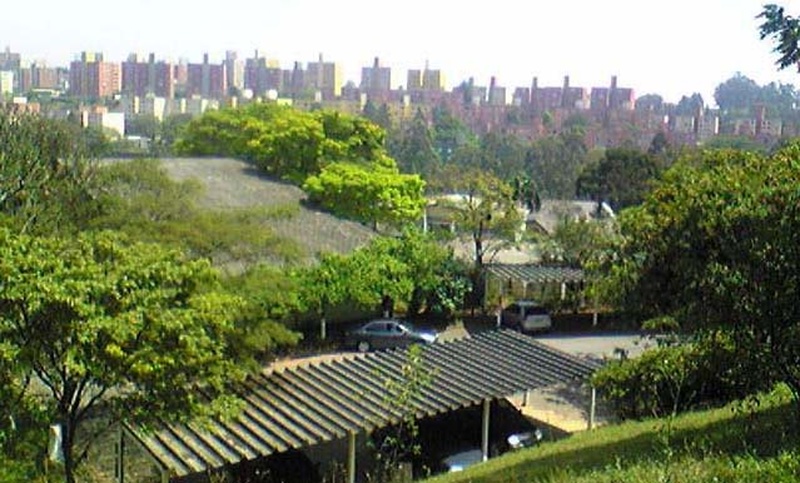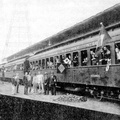Winners and losers
On August 14, 1945 (one day behind Japan time due to the time difference), news arrived that their homeland had been defeated in the war. For the immigrants who had hoped to return home someday, defeat meant that they had no place to return to.
In addition to this psychological resistance, many people thought, "It's already strange that the Emperor's sacred edict was published in the newspapers in Portuguese," and "There is no reason why an official envoy should not be sent to Brazil, where 200,000 compatriots live," and rumors spread that Japan had actually won. Seventy to 80 percent of the immigrants belonged to the "winning group" and believed this.
On the other hand, the leaders of the immigrant community, having learned their lesson from arrests and asset seizures during the war, feared the Brazilian government, accepted defeat, and became the "losers." They began to suppress the winners out of concern that the winners would eventually start criticizing the Brazilian government and that they would be caught in the crossfire.
The people on the winning side felt betrayed by the fact that the leaders who had preached about promoting the national prestige of the Empire of Japan before the war suddenly began to preach about defeat. The losers even went so far as to say, "Since we lost, we no longer need the Hinomaru flag."
"I stood up for the dignity of the Japanese nation and the Imperial Family."
Retired Army Colonel Jinsaku Wakiyama, who was considered the leader of the losers, was assassinated by four young men from the winners group. One of the assassins, Tokuichi Hidaka, said the following:
We didn't do it for the sake of winning or losing. We stood up for the dignity of the Japanese nation and the Imperial Family. I'm sorry about Colonel Wakiyama, but I didn't have any grudge against him personally.
"Another Story of the Winners: 70 Years of Postwar Japanese Immigrants in Brazil"
Written by Masayuki Fukazawa / Mumeisha Publishing
Hidaka immediately turned himself in and spent two years and seven months on the island prison, but afterwards, his government-appointed lawyer told him that he would be released because "there was no witness to the crime." Hidaka insisted, "That's not true. I ruined someone's family, so there's no justification for releasing me for something like this," and he was sentenced to about 30 years in prison.
In the end, he was released after 10 years, but "if a Japanese person lives a normal life, they are a model prisoner, so their sentence gets shortened." Even terrorists have pure Japanese hearts.
These incidents prompted Brazilian authorities to launch an investigation in which they investigated over 30,000 people they considered to be winners, meaning one in seven Japanese residents in the country. Some immigrants were told that they would be released from detention if they stepped on a portrait of the emperor, and those who refused were sent to an island prison.
"To instill a love for Japan in children"
Four or five years after the war, a sense of resignation began to spread: "The war is over and Japan has lost. But Japan remains. Japan is overflowing with repatriates and there is a food shortage, so there is no place to return to. Besides, our children have grown up in Brazil. Will we have no choice but to spend the rest of our lives in Brazil?"
However, they used that resignation as a springboard to aspire to "have their children study hard here, go to a good university, and gain a respectable position in society. In that way, they can show the Brazilians who made fun of them during the war." Calling the University of São Paulo "Brazil's University of Tokyo," their parents worked themselves to the bone to send their children there.
In addition to studying, some people thought, "Let's focus on Japanese language education to instill a love for Japan in children," and devoted themselves wholeheartedly to Japanese language education and the preservation of Japanese culture.
In my book, "The Japan Admired by the World: The Japan the Japanese Don't Know," I introduced an essay titled "Genshuku na Kimochi" ("Thankful Feelings"), written by 17-year-old Natalia and Emi Asamura, who visited the former Naval Academy in Etajima, in memory of the war dead.
Natalia is a student at Shohaku Gakuen in Sao Paulo, which sends 20 to 30 students to Japan once a year, where they travel from Okinawa to Hokkaido over a period of about 40 days.
The cost of a plane ticket halfway around the world and accommodation for 40 days is a considerable burden for the parents sending the delegation, but the heartfelt wishes of Japanese parents - "I want my children to be proud of their roots" and "I want them to see beautiful Japan" - have supported the mission's dispatch for 40 years.
Even in such a situation where their country had been defeated and there was no hope of returning home, they continued to work hard and stay positive, demonstrating the deep-rooted energy of the Japanese people.
"We survived because we kept alive the light of the Japanese language and culture."
Mr. Fukasawa quotes the following comment he heard from a second-generation elder from the winning group:
After the war, the descendants of the losers gradually left the colony, assimilated, and disappeared, but we survived because we kept the light of the Japanese language and culture alive. And now we live in an age where that is valued.
(Ibid.)
If they lose their "roots" as Japanese people, they will be assimilated and absorbed by the overwhelming majority of Brazilians. On the other hand, those who have cherished and nurtured the roots of Japanese language and culture can make unique contributions to Brazilian society, and these are valued.
In his edited book, Nikkei in Brazil, Kiyoshi Harada, an authority in Brazilian law, writes that Nikkei are people who "have a Japanese soul but behave like Brazilians" and who "have inherited an inseparable bond with traditional Japanese culture that is no longer found in their home country."
When Fukasawa asked Harada, "What kind of traditional Japanese culture will be passed on to the next generation?" Harada replied, "I think things like diligence, seriousness, a sense of responsibility, obligation, gratitude, and courtesy will remain."
These virtues are the very roots of the Japanese people. In our home country of Japan, our roots were almost completely severed by the historical discontinuity caused by the occupying forces and the subsequent leftist ideology, but the Japanese in Brazil made deliberate efforts to grow their roots thick and deep, and the energy that flowed from them has allowed them to build an admired position in Brazilian society.
The story of the struggles of Japanese people in Brazil shows us two things.
First, the roots of the Japanese people have grown strong, thick roots, grown impressive trunks, and blossomed into beautiful flowers, even in the foreign land of Brazil. This fact shows that the roots of the Japanese people have a universal quality that is applicable around the world. This is a valuable insight for Japanese people living and working abroad now in various parts of the world.
Secondly, the Japanese in Brazil overcame hardships with the energy of their Japanese roots, and in the process, they made their roots grow thicker and deeper. This points to hope for the Japanese people living in the Japanese archipelago, who are currently facing many hardships in areas such as defense, the economy, and an aging population with a declining birthrate.
We would like to express our deepest respect and gratitude to our compatriots in Brazil for their century-long struggle, which has taught all modern-day Japanese people such a valuable lesson.
*This article was written for the email newsletter "Japan on the Globe: Training Course for International Japanese People," which has 43,000 subscribers and was founded 18 years ago. It was originally published on Mag2NEWS (June 26, 2017) and is reprinted here with permission.
© 2017 Masaomi Ise




